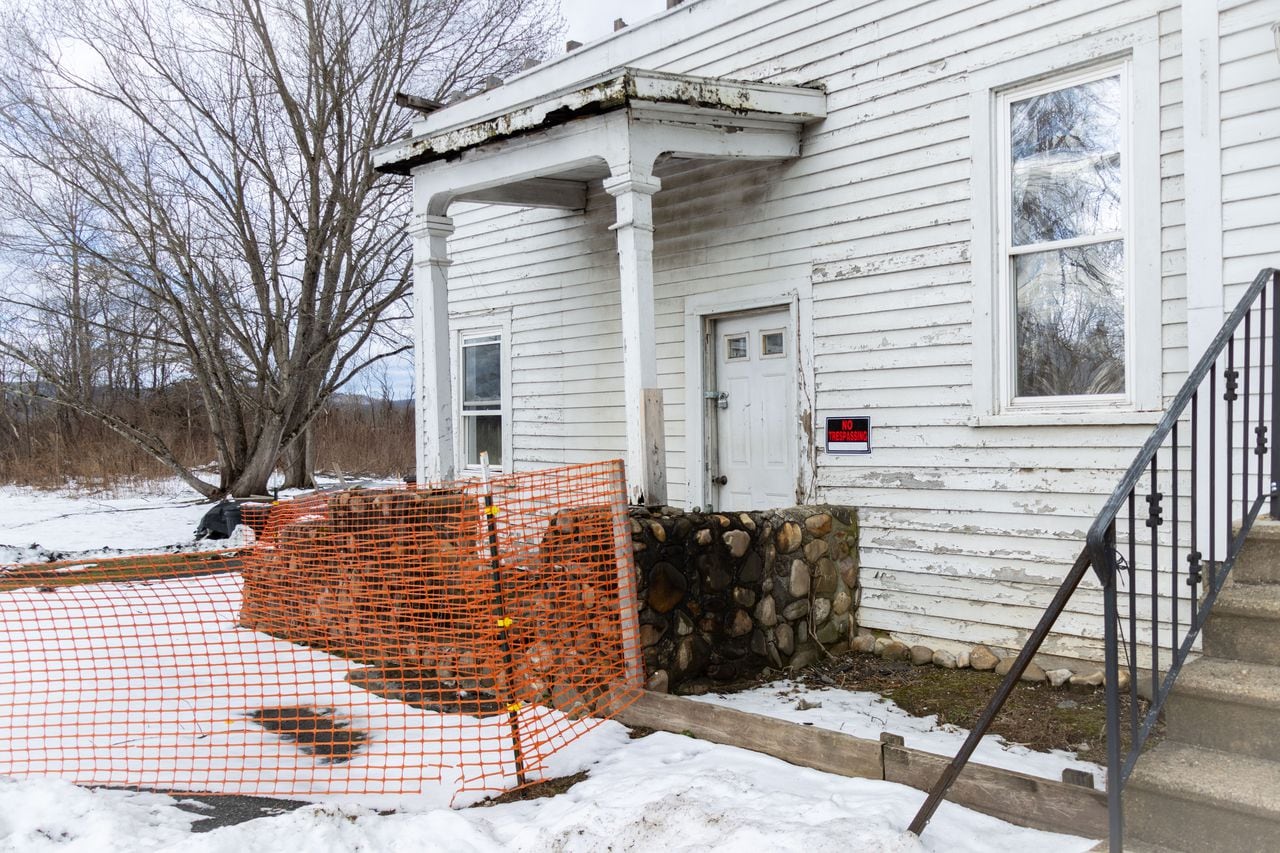On the first night that Ashleigh Young, her partner, her 7-year-old son, and her 14-year-old daughter moved into their Deerfield apartment in November 2021, a light fixture in her son’s bedroom fell from the ceiling.
It only got worse from there.
During their first two winters in their new home, it got so cold in the apartment that the family was forced to huddle together in their living room, the only room with adequate insulation, for warmth.
In Massachusetts, residential properties must be heated to at least 64 degrees at night and 68 degrees during the day between Sept. 15 and May 31, but Young regularly measured temperatures in the 50s, she told MassLive last year. They dealt with incessant electrical issues whenever they tried to use kitchen appliances, tripping the breakers almost daily.
Their former landlord never addressed many of these or the numerous other issues, despite a June 2022 order from Deerfield town officials ordering him to fix them. Despite new ownership, a housing court trial and numerous attempts to get the town to intervene, Young’s family still faces problems in their home on a daily basis.
Their landlord wants them out, and they don’t want to stay, but with record-high housing costs across the state, they can’t move.
“The amount of fighting that I have to do, the amount of documentation that I have to provide, the amount of photos and video proof that I provide to just continuously be ignored and invalidated is really, really stressful,” Young said. “I have never in my life dealt with this.”

Wooden planks were nailed over this window in Young’s hallway by her landlord. (Tréa Lavery, MassLive)Tréa Lavery/MassLive
Under new ownership
In November 2022, Robert Obear, owner of Northern Enterprises LLC of Montague, purchased the home for $650,000, with the intent to redevelop the property.
Young’s family are the only remaining tenants in the originally three-family home. Her downstairs neighbors moved out in the months after Obear took over. The third unit was demolished last year due to damage from a downed tree.
She told MassLive she believes Obear’s redevelopment plans are the reason problems still persist.
“I have made it clear to him from day one that I’ve been trying to get out of here from before he even bought the place,” she said. “There is nothing that could keep me here, no amount of money, no amount of repairs. … I’m just so traumatized from everything.”
Obear did not respond to requests for comment for this story.
Some things have improved since last winter. Obear now keeps the thermostat set at 73 degrees, which generally keeps the apartment within the legally required temperature zone.
But not all of the radiators in the building are working. And Young says because the thermostat is in the living room, the warmest room in the unit, the heat in other rooms does not always get as high before it shuts off again.
- Read more: Mass. Gov Healey’s housing bond bill gets widespread support at hearing, but some hang-ups remain
Obear has also replaced the oven hood, which used to cause a lot of the electrical issues. Young said she now has to reset the breakers about every two weeks, down from almost daily.
Despite these and other smaller fixes since Obear took over, other concerns are still at the front of the tenants’ minds.
One of Young’s biggest challenges has been mold and algae growth all over the home. She and her children have dealt with chronic health problems since a few months after moving in, which she has been told by doctors is connected to the presence of mold.
Her son, who had never had respiratory problems before, now uses an inhaler, and missed more than 50 days of school last year due to illness, she said.
Young, who’s allergic to mice, has seen her own health impacted. They, along with other pests, frequently get into the apartment, likely through holes in the foundation, she said.
Obear has sent pest control workers several times to set traps, but Young still finds dead mice and droppings throughout the building. The family always washes their pots and pans in the sink before cooking because they have found droppings in the floor-level cabinets where they are stored.
In addition, Young told MassLive that during an energy assessment in December, the assessing technician found ice in the walls of the building, indicating both leaking moisture and a lack of insulation. She has not yet received the assessment report.
Ashley Benedetti, a disability advocate and friend of Young’s working with her to address her housing situation, said she immediately noticed problems the first time she visited the apartment. Benedetti said she and colleagues she has spoken with have not seen a situation like Young’s before.
“We have to read those horror stories for our training, and there have been some horrible ones,” she said. “Hearing that my friend who is disabled is going through some of the similar things that I’ve seen in these horrifying documentaries, it’s like, alright, that’s it. I can’t stand by anymore.”

Ashleigh Young and her family no longer use the front porch at her Deerfield home because parts of the wood are broken or rotting. (Tréa Lavery, MassLive)Tréa Lavery/MassLive
Going to court
In January 2023, Obear filed an eviction to remove the family for nonpayment of rent, after Young withheld payments due to the conditions in the unit.
In July, the eviction made it to court for a two-day trial, during which Young, who was representing herself, said she tried to explain the conditions she was dealing with. She said she felt belittled by the landlord’s legal team, who repeatedly called her difficult.
A judge eventually ruled that while Obear owed $4,500 to the tenants for one of the winter months where the heat in the apartment was inconsistent, the family owed him $7,500 plus court fees, for a total of $8,328.92, for the remaining months where they did not pay rent. If they were able to pay within 10 days, they could remain at the apartment.
In his decision, Housing Court Judge Jonathan Kane wrote that while Young had claimed the eviction had been in retaliation for her complaints about the conditions, this was not the case as Obear served the notice to quit immediately after taking control of the property, without any knowledge of the heating, hot water and electrical issues.
As evidence, he referenced a September 2022 letter from the town’s board of health saying there were no code violations at the home, theorizing that the weather at the time of the inspection had not been cold enough to identify the existing problems.
Kane added that Obear had repeatedly sent technicians to the property to address the heating issues, “which both evidences a diligent effort to address the problem and indicates the severity of the problem.”
Kylie Brunner, who lived in the apartment before Young and her family moved in, told MassLive the poor conditions at the home predated even her time there, and prompted her to move out before her lease was up. The basement flooded frequently, the roof leaked and electrical problems were never addressed because it would have required rewiring.
“They offered us $200 off our rent every month if we would just deal with it,” she said. “We assumed it was safe, but there were definitely outlets in almost every room that didn’t work.”
After the trial, the tenants were able to scrape together just enough money, despite Young being out of work at the time, but then struggled to remain up-to-date on rent after depleting their resources.
In September 2023, Obear again sent them another notice to quit for nonpayment of rent, but Young told MassLive in December that they were able to again catch up and at that point were fully paid.
“I’m at the point now where I know there are condition issues, but I also know if I withhold rent, he will happily go down the eviction path again,” Young said. “So it’s like he’s won pretty much, because now I’m in between a rock and a hard place.”

Young no longer bothers covering the space below her oven, because keeping it open makes it easier to clean out mouse droppings. (Tréa Lavery, MassLive)Tréa Lavery/MassLive
Fighting for repairs
After the town inspected the unit again at Young’s request in November 2023, its report, reviewed by MassLive, listed only a handful of minor issues that needed to be repaired.
Some larger issues, such as mildew on the exterior of the building and rotting under the eaves, were described as not affecting “the habitability of the second-floor apartment.”
Young, however, disagreed with the findings from the inspection, and felt that things had been left out. When a reporter visited her apartment earlier this month, she pointed out numerous issues not addressed in the report.
In the kitchen, a loose-fitting sink had led to water leaking into the cabinets below, rotting the wood, and the entire counter can easily be lifted up as it is not attached. Inspectors concluded that there was “no evidence of mold or excessive moisture under the sink.”
Electrical issues in that room are blamed on multiple appliances being plugged into one outlet. But Young says she only ever has one appliance plugged in at a time and still experiences problems.
The exterior door the family uses is supposedly weatherproofed, but it swings open unless it’s locked. And even when it’s closed, light can be seen coming in from outside through the cracks around it.
- Read more: Mass. has spent $30M on shelter system over last two weeks, Healey’s admin. says in new report
Young also worries about the basement, where she used to have a washer and dryer, but which is now mostly blocked off except for access to the breaker.
The basement flooded in July 2023 when the town was deluged with heavy rain, but unlike most of her neighbors, she says it has flooded many times before and since.
The inspection report acknowledges “a small amount of moisture in one area” of the basement, pointing out that the stone foundation is 100 years old.
Valerie Bird, Deerfield’s assistant health agent who conducted the inspection, provided language from the Massachusetts General Laws about the inspection process, but did not otherwise comment on Young’s case.
Young said she believes her landlord and the town inspectors think she is concerned only about cosmetic issues. But she feels differently.
“I can’t say they’re not doing anything, but they’re not doing the things that are my concerns,” she said. “I continue to point small things out because the big things still aren’t fixed.”

The roof over this entrance at the back of the house fell last year, damaging Young’s car, which was parked next to it in the driveway. It was propped up with a two-by-four and Young now parks her car in a different spot. (Tréa Lavery, MassLive)Tréa Lavery/MassLive
Trying to get out
Young and her family have been living at the home without a lease since Obear purchased the property. With all the challenges, she said she is desperate to leave, but until now, hasn’t been able to. Since March 2022, she has been looking for other apartments, but with the high cost of housing combined with owning a large dog, it’s been virtually impossible.
According to rental real estate platform Zumper, the average rent for a three-bedroom apartment in the Greenfield area is over $2,500 per month, more than $1,000 more than the family currently pays.
Young said she has sent 257 apartment inquiries since March 2022, but has only heard back from three people, filled out one application and seen one unit. All three times she heard back, it was a no.
“We’re not even getting responded to. Our applications aren’t even being processed,” she said. “What is a person in my situation supposed to do? I feel backed into a corner. I don’t feel like I’m even safe.”
Young said she is done looking to the town or the courts for help, and will instead focus her energy on finding a new home for her family.
“All I want is a home where me and my kids feel safe and we’re not getting sicker than we already are, and I want to pay for that in return,” she said.





